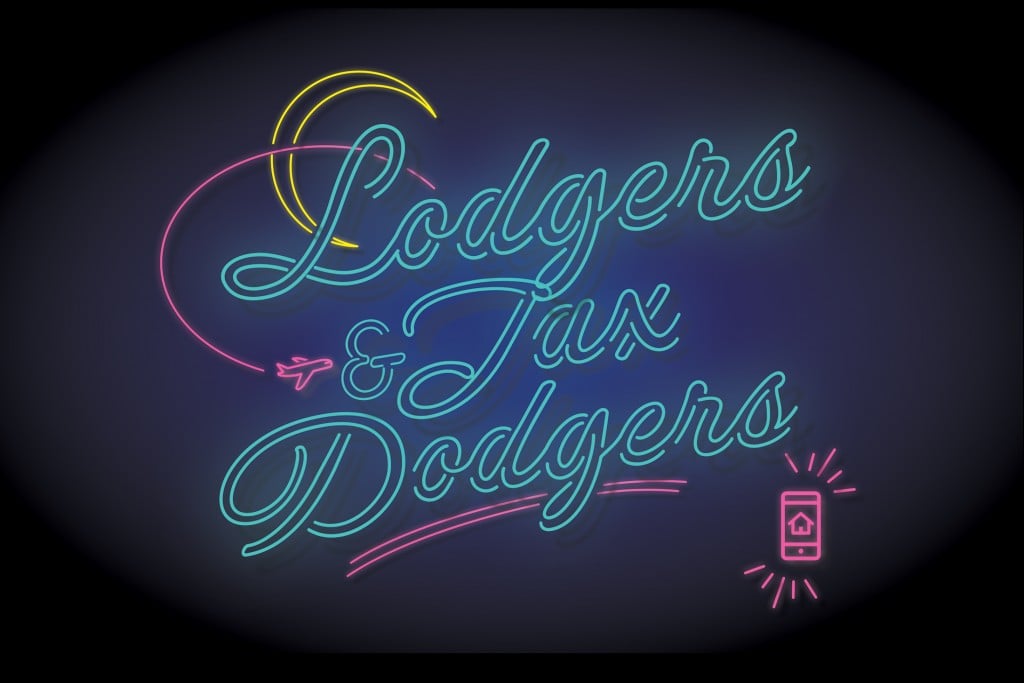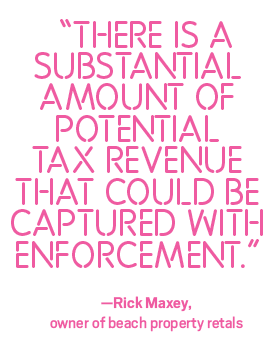Lodgers and Tax Dodgers

It was dark and raining when my plane touched down in Honolulu for my mini-vacation, so I used my GPS to guide me to where I would spend the next two nights. But, instead of taking me to Waikiki’s well-lit, palm-lined boulevards, the GPS’s digitized voice directed me through suburban neighborhoods up into Manoa.
• When I arrived at the address, I parked, looked nervously up and down empty streets echoing with dog barks and found a house that looked like the one I had booked on Airbnb. Following my host’s prearranged instructions, I crossed the garage to the back of the house and fumbled for the light switch in a large room. A green guestbook and a compilation of area attractions sat on a table against the far wall, but something was off – I hadn’t climbed any stairs and there was no birdcage like the instructions described. Despite the late hour, I rang the number on the listing. “This happens all the time,” said my host as she led me out, through a different door and up carpeted stairs to the smell of spaghetti leftovers.
This was a new experience for me, as it is every year for tens of thousands of visitors to Hawaii who use sites such as Airbnb and VRBO (Vacation Rentals By Owner) for the first time, instead of staying at a traditional hotel. “It’s a very different market for a very different demand. Someone’s home is not a hotel,” says Matt Curtis, the government relations director for HomeAway, VRBO’s parent company.
That difference – homes are not hotels – has raised several big issues, including: how B&Bs and room, condo and house rentals are changing the character and quality of life in Hawaii’s residential neighborhoods (which Hawaii Business has covered repeatedly), and how these nonhotel landlords often fail to collect or pay the excise and hotel room taxes, depriving the state and counties of key sources of revenue. The thinking is, tourists benefit from government services, including roads, police, lifeguards and much more, and should help pay for those services.
“At the end of the day, people do benefit from having choices in life,” says Mufi Hannemann, the former Honolulu mayor and now president of the Hawaii Lodging and Tourism Association. “We’ve been doing four straight years of increases in tourism arrivals. … But what we’re noticing now is that spending is starting to flatten out. To me, that should compel the local government and state officials … to really go after those who are not paying. And, it’s clear those folks who are choosing to stay in transient rentals are not paying their fair share.”
State law requires all owners of short-term rental properties to acquire a certificate of registration from the Department of Taxation and to pay both the general excise tax (4.5 percent on Oahu, 4.0 percent elsewhere) and transient accommodations tax (9.25% statewide) on the room rate. Hawaii’s TAT is levied on the operator of any accommodation rented for less than 180 consecutive days. But, as Hannemann suggests, it appears that many private operators do not collect the taxes, or report the revenue to the government, even though they are breaking the law. Hannemann says that’s because “There is no manpower and a lack of enforcement.”
Mallory Fujitani, public information officer for the Hawaii Department of Taxation, says speculation over how well the law is or isn’t being enforced is purely conjecture. “We have very strict confidentiality rules regarding tax data,” she says. “But there are always going to be people who are going to try to not comply with tax laws.”
When someone registers for a tax license, but there is no corresponding TAT license for them in the tax department’s system, that signals there is possible noncompliance, says Fujitani. “I really can’t give you more specifics on how we find possible noncompliance,” she says.
“It’s very difficult to determine the rate of compliance. In a voluntary compliance system (like the state and the U.S. has) we expect people to acknowledge their tax obligation and file their tax as required by law. We have no idea who should be paying but is not.” As for penalties collected to date, “the short answer is that we don’t have information about the penalties,” she says.
After I settled into my Manoa digs, a small room cozily outfitted with a floral comforter, a yellowing three-book collection of Shel Silverstein children’s poems and a down-the-hall bathroom shared with my bedroom’s former full-time occupant, I sat with owner Karen “Lucky” Thornton to learn more about her home.
“It was my daughter who got me on Airbnb and I’m infinitely grateful to her,” she says. “I get to share what I love about Hawaii with others.” The five rooms she rents comprise her main source of income; Airbnb, she says, takes a 3 percent cut.
Thornton’s Airbnb listing was one of the few I encountered that included a tax ID number, indicating that her rental is registered to pay taxes; the only “tax” on my bill, however, was $16 service fee to Airbnb and a $15 cleaning fee that goes to Thornton. It’s up to Thornton to report the revenue from my stay to the Hawaii Department of Taxation.
In addition to the state tax laws, each county has its own zoning rules. In the City and County of Honolulu, for example, unless a property was sanctioned by the zoning department as a short-term rental before Dec. 31, 1989, it’s an illegal operation. In many popular neighborhoods around Hawaii, thousands of homeowners are breaking the zoning laws.
“I was informed pretty early on that what I was doing was quote-un-quote illegal,” Thornton says. “But I don’t worry about that too much. I just make sure that I pay my taxes. I don’t mind paying taxes. It means that I’m making money.”
However, not every Airbnb or VRBO lister pays taxes. State Department of Taxation representatives say many people – especially those from out-of-state, who see short-term rental properties as an investment – might confuse the separate issues of local zoning and state tax laws.
“Regardless if the short term rental is legal in the eyes of the county land use agencies, if they (homeowners or property managers) are collecting revenues from these rentals, then they will owe the state of Hawaii the appropriate TAT and GET on those revenues,” says Fujitani. “And, the penalties can get pretty stiff if they are not reporting them … the statute of limitations doesn’t expire … so people are really taking a risk not to comply.”
For many – particularly first-time – renters it can be challenging to find all of the statutes and rules to which they are required to apply. Few listing sites assist their renters in wading through local regulations. “Airbnb did not tell me what I needed to do to comply. I am a small business owner, so I knew where to look,” says Thornton.
Airbnb does not automatically collect taxes in Hawaii, but it does so in 13 U.S. municipalities and four states, and several foreign jurisdictions, including the cities of Paris and Amsterdam, and the nation of India, according to Airbnb’s website. News reports indicate that Airbnb started collecting taxes in many of those jurisdictions only after strong pressure from local governments, including the threat of barring its operations. When contacted by Hawaii Business, Airbnb declined to answer questions about how it conducts business in Hawaii.
HomeAway says VRBO does not collect taxes on its listings because it is simply an advertising venue. Unlike Airbnb, which takes a percentage of the landlords’ revenue, VRBO makes its money from listing fees and farms out payment processing to a third-party system for any resulting transactions. “Because we at our core are really just an advertising venue, we’re really no different than the back of a newspaper,” HomeAway’s Curtis says. “… The people, though, that use our site to advertise properties, they are the actual stakeholders on the ground in Hawaii.”
However, HomeAway says it offers workshops and webinars to educate property owners on how to comply with regulations and interact effectively with local government.
Hotel association president Hannemann suggests the hosting sites should do more to help ensure that all property owners and landlords pay their taxes and level the playing field with other accommodation options. “In the interest of fairness and being a good citizen of the community, I think it’s a responsibility they all share,” he says.
Rick Maxey is the owner of several beach property rentals, including Lanikai B&B on Oahu, one of the few county-licensed B&B operations in the area. He says that, as a licensed and tax-paying operation, his frustration stems from how easy it seems to be for others to get away with noncompliance. “There is a substantial amount of potential tax revenue that could be captured with enforcement,” Maxey says. While he has had to work and pay to maintain annual renewals on his nonconforming use permits, many others enter the market without those same cares, costs or effort. “Not everyone is – or should be – a hotelier,” he adds.
Maxey lists some of his properties on VRBO, “because everybody else is and it seems to be up with the times.” But most of his bookings come directly through his website, “and they also involve a live phone call to make sure our properties meet vacationer’s wants and needs,” he says.
A new law that went into effect Jan. 1, 2016, may compel Airbnb and HomeAway to assist property renters in their tax compliance. Act 204 of the 2015 state Legislature requires all advertisements listing short-term rentals to include a tax registration identification number. Individuals who do their own advertising – online or otherwise – are now also required to include their registration number. The law says citations may be issued to any noncompliant listing site, with fines between $500 and $5,000 a day. Violators could also be subject to criminal penalties, including up to a year in jail. “Actually, the fine would be on the advertisers,” says the tax department’s Fujitani. So Airbnb, VRBO and similar companies are required to collect the tax registration numbers of people who want to advertise on their sites, she says.
“The purpose of requiring advertisers to list their tax ID number is to help provide more data to identify the possible nonfilers,” Fujitani says.
This is not the first time the state has moved to hold online travel companies liable for taxes. The state Supreme Court ruled in March 2015 that Travelocity, Expedia and five other online travel booking sites must pay $53 million in general excise taxes.
Whether taxes are collected or not, the short-term rental market in Hawaii’s residential neighborhoods will likely continue to flourish. As I prepare to leave Thornton’s Manoa home, I flip through my in-room guest book filled with rave reviews from visitors from as far afield as New York, Switzerland, Singapore, Seattle, Norway and Thailand. The previous guest had entered his feedback just three days before I arrived. “The biggest comment I get is that my house feels like home,” Thornton says.
“Airbnb has been a wonderful venue for me” as a small-business owner, she adds. “I see it as a win-win.”

How Much Unpaid Taxes? We Try the Math
It is difficult to say how much of the Transient Accommodations Tax is not collected each year because of noncompliance by short-term rental operators. The state Taxation Department would not provide Hawaii Business with an estimate and we found no credible third-party figures while doing research for this story. So here’s our own back-of-the-envelope calculation for what could be collected by the state if everyone were to comply:
We started with SMS Research’s 2014 estimate of statewide individually advertised rental units, 22,238. We multiplied that by the 9.25 percent TAT tax rate, then multiplied by Airbnb’s average statewide listing price, which we calculated to be roughly $200 per night. We assumed all rentals were booked 365 days a year at the same average occupancy rate as Hawaii hotels, 77 percent, as listed in HTA’s 2014 Annual Visitor Research Report. (For those who got an A in math, here is the equation: 22,238 x 0.0925 x 200 x 365 x 0.77.)
The result: $115.6 million in TAT taxes generated by short-term vacation rentals. Use the same calculation for the 4 percent excise tax, and that brings the total to $165.6 million. That theoretically is what should be paid by short-term vacation rentals; the state Taxation Department did not say how much is actually paid, but observers suggest only a fraction of the applicable taxes are collected. Furthermore, the state collected $420.97 million in TAT in the latest fiscal year; that figure was close to the total we calculated for TAT paid by hotels, condo hotels, timeshares, hostels, apartment hotels and other “traditional” accommodations, indicating there is money missing from other sources.
The caveats: Airbnb-listed properties may not have as high an occupancy rate as traditional hotels, but it’s likely that the number of Airbnb-listed properties in Hawaii has risen since the 2014 SMS study, so those two factors may cancel each other out. Also, Airbnb listings tend toward the one-room style of private rentals, while other vacation rental distribution channels observed in the report such as VRBO, which are not included in our calculation, lean more toward whole-house rentals, which would indicate our average daily price was too low, not too high.
Do you have a better calculation? Let us know at





